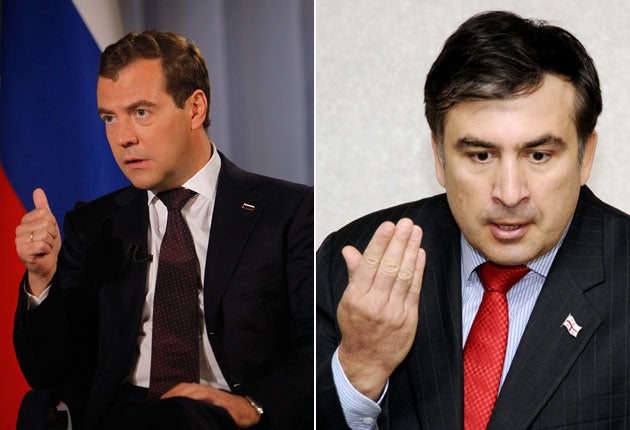Medvedev reignites war of words over blame for Georgia conflict

Your support helps us to tell the story
From reproductive rights to climate change to Big Tech, The Independent is on the ground when the story is developing. Whether it's investigating the financials of Elon Musk's pro-Trump PAC or producing our latest documentary, 'The A Word', which shines a light on the American women fighting for reproductive rights, we know how important it is to parse out the facts from the messaging.
At such a critical moment in US history, we need reporters on the ground. Your donation allows us to keep sending journalists to speak to both sides of the story.
The Independent is trusted by Americans across the entire political spectrum. And unlike many other quality news outlets, we choose not to lock Americans out of our reporting and analysis with paywalls. We believe quality journalism should be available to everyone, paid for by those who can afford it.
Your support makes all the difference.Three years after the short, bitter war that left hundreds dead and redrew the map of the Caucasus, Russia and Georgia have been trading insults and accusations over what happened in the run-up to the conflict.
The war started three years ago today, when Georgia ordered a late-night assault on its "breakaway region" of South Ossetia, aimed at bringing it back under control. Russia responded, crushing the Georgian army and going on to occupy large swathes of Georgia briefly. In the aftermath, Russia recognised South Ossetia and another Georgian region, Abkhazia, as independent nations, infuriating Georgia. The two countries still have no diplomatic relations, and both sides insist that the other was the aggressor.
In the latest salvo from Moscow, the Russian President, Dmitry Medvedev, used an interview with Russian and Georgian journalists late last week to call Georgia's President, Mikheil Saakashvili, a man who "often fails to control his speech". In sharp remarks more characteristic of his predecessor, Vladimir Putin, Mr Medvedev attacked Mr Saakashvili as "a person I will never shake hands with", and called him "a difficult man to avoid, because he is so sticky". He also said he would like to see Mr Saakashvili put on trial for war crimes.
Mr Medvedev even hinted at US involvement in Georgia's decision to attack South Ossetia.
"The moment of truth for me, as I realised later while analysing those events in hindsight, came with the visit by secretary of state Condoleezza Rice," said Mr Medvedev. "Following that visit, my Georgian colleague simply dropped all communication with us... It was apparent that he had new plans." Mr Saakashvili has previously given a very different account, claiming that he tried hard to initiate contact with Mr Medvedev, but was rebuffed.
A spokesman for Mr Saakashvili shot back yesterday that Mr Medvedev was using "Cold War rhetoric", and accused Russia of "unsuccessful attempts to resurrect the Soviet empire".
In his interview, Mr Medvedev also claimed that he had given the order for Russian troops to respond to Georgia's attack in 2008 without so much as consulting with the Prime Minister, Vladimir Putin, who was attending the Olympics opening ceremony in Beijing. He said he only spoke with Mr Putin 24 hours after the war started. The claim, which most Russian analysts dismissed as implausible, appears to be part of an effort to portray himself as an independent figure and not entirely subservient to Mr Putin. The two men have yet to publicly state which one of them will stand in elections due next spring.
Join our commenting forum
Join thought-provoking conversations, follow other Independent readers and see their replies
0Comments